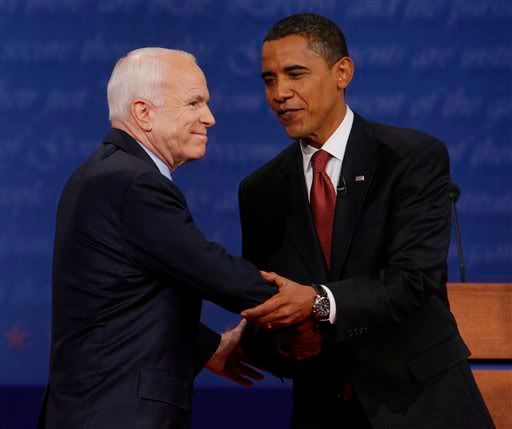McCain As The Alpha Male

There were no knockout blows in the first presidential debate of the fall, but John McCain out-pointed Barack Obama often enough to encourage his followers that he can somehow overcome the odds and deny the Democrats the victory that has seemed to be in store for them.
It was a small thing, but I counted six times that Obama began a sentence with the words that McCain was "absolutely right" about a point he had made. No McCain sentences began with a similar acknowledgement of his opponent's wisdom, even though the two agreed on Iran, Russia and the U.S. financial crisis far more than they disagreed.
That suggests an imbalance in the deference quotient between the younger man and the veteran senator -- an impression reinforced by Obama's frequent glances in McCain's direction and McCain's studied indifference to his rival.
Whether viewers caught the verbal and body-language signs that Obama seemed to accept McCain as the alpha male on the stage in Mississippi, I do not know.
But it reinforced my impression that McCain was the more aggressive debater. He flung the adjectives that stick in a listener's mind, calling Obama "naive" and therefore "dangerous."
ad_icon
Given that most of the debate was on foreign policy and national security, supposedly McCain's strong subjects, the Obama camp is justified in thinking that their guy did not embarrass himself.
Obama made his point that the preoccupation with Iraq -- which McCain in effect confirmed -- had cost the United States in Afghanistan and in Pakistan, where Osama bin Laden is believed to have built his base of operations, and in the eyes of the world.
And while Obama continued to struggle to explain his original opposition to the "surge" strategy implemented by Gen. David Petraeus and championed by McCain, he did put his opponent on the defensive.
"John, you like to pretend like the war started in 2007," he said. "You talk about the surge. The war started in 2003. And at the time, when the war started, you said it was going to be quick and easy. You said we knew where the weapons of mass destruction were. You were wrong. You said that we were going to be greeted as liberators. You were wrong. You said that there was no history of violence between Shia and Sunni, and you were wrong." All that, Obama said, counts against McCain as an arbiter of future security policy.
That was a clean hit, but there were few others from that direction. And McCain was loaded for bear on everything from Obama's history as a seeker of earmarks to his readiness for talks "without precondition" with Iranian President Mahmoud Ahmadinejad.
The biggest surprise was the shared diffidence on the topic du jour -- the Wall Street bailout plan. Neither candidate would give moderator Jim Lehrer a straight answer as to whether he supported the administration request for a $700 billion rescue effort.
They were even more evasive when Lehrer pressed them to say how they would adjust their ambitious plans to accommodate the budgetary effects of that massive government expenditure.
It was Never-Never Land, as Obama and McCain struggled to avoid the full implications of this economic policy calamity. McCain finally threw out the possibility of a freeze on all federal expenditures except defense, veterans' care and entitlements -- but Obama immediately objected, citing his eagerness to boost early childhood education.
Perhaps the next two debates will offer opportunities to pin these artful dodgers down on how they would operate under the burdens the Bush administration will leave behind. Otherwise, the voters may go to the polls with only the vaguest idea of the truly tough choices the next president will face.
The pre-debate polls showed a definite tilt toward Obama, keyed to the worsening climate. This debate probably did little to change that. It would behoove someone to start talking realistically about the difficulties that lie ahead. A little candor would do wonders for this race.
Source